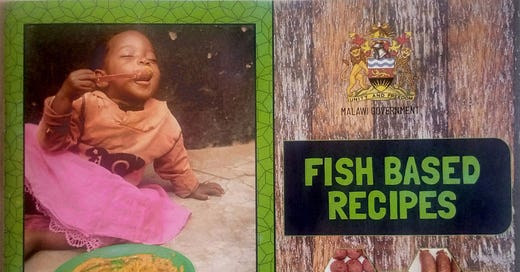FISH BASED RECIPES
Incorporating fish-based recipes into nutrition programmes with the goal of improving dietary and child feeding practices.
Fish Based Recipes: A booklet with easy-to-follow fish and fish products preparation tips.
LILONGWE (Malawi) - People living along the coastline of Lake Malawi and other other lakes such as Malombe and Lake Chilwa as well as those along Shire River have for long relied on fish as the focal dish served with either nsima or rice almost on daily basis. It is no surprise then that when people living near the lake think of a meal, they think of fish.
Fish is a crucial ingredient for food and nutrition security in Malawi, a Southern African country endowed with enormous natural resources. Statistics shows that fish provides over 60 percent of the dietary animal protein intake and supplies 40 percent of total proteins to the diets of people in the country.
Experts say consuming fish helps maintain a healthy heart by lowering blood pressure and reducing the risk of sudden death, heart attack, abnormal heart rhythms, and strokes. It also aids in healthy brain function and infant development of vision and nerves during pregnancy.
Adequate consumption of fish is positively associated with increased growth and cognitive development especially during 1000 days of a child’s life and with the improvement in the overall health and nutritional status of women and children.
However, the majority of the Malawian population only consume fish as a form of dish served with either nsima or rice. The remarkable thing about fish is that people living near the lake can eat it almost daily without getting tired of it unlike other types of dishes. The key factors are the type of fish and how it is prepared.
“We rely on fish for our meals because it is readily available and compared to other dishes, we can enjoy fish almost daily without complaints. Says Fatuma George commonly known as Abiti George of Chia in Nkhotakota. Similar sentiments are shared by a number of peoplr in other lakeshore districts.
Fish accounts for over 60 percent of animal protein intake in Malawi. Here scores of people are buying fish at one of fish landing sites, Senga Bay in Salima district. Photo credit: Dr. Daniel Jamu.
In an effort to help people diversify their ways of consuming fish, the Department of Fisheries in the Ministry of Natural Resources and Climate Change with support from the African Development Bank (AfDB) funded Sustainable Fisheries, Aquaculture Development and Watershed Management (SFAD-WM) project in collaboration with Lilongwe University of Agriculture and Natural Resources (LUANAR) and WorldFish developed a fish-based recipe booklet. This booklet offers a variety of ways on how fish can be prepared and consumed.
The booklet serves as a guide for staff from government agencies and non-governmental organisations to incorporate fish-based recipes into nutrition programmes with the goal of improving dietary and child feeding practices in the country. It focuses on small fish species like usipa and matemba as they are rich in minerals, vitamins, proteins, and essential fatty acids all of which are vital for health of pregnant women and children.
The recipes found in the booklet were developed and field tested in Chikwawa, Zomba in the southern region, Dowa in the centre and Mzuzu in northern region of the country. These recipes can easily be adapted for use in different parts of the country to fit in local food, eating patterns and seasonal availability of different foods.
Using the booklet’s easy-to-follow recipe preparation tips people can make fish powder, fish spice, fish-based biscuits, prepare fish-based porridges, fish-based snacks, fish-balls, sausages, doughnuts and scones, among others.
It is for this reason that government departments and non-governmental organisations implementing nutrition activities in Malawi are encouraged to make use of this fish-based recipe booklet. Perhaps what is remaining is to translate it into several key local languages for easy adoption at grassroot level.
The Ministry of Natural Resources and Climate Change is grateful to various partners such as African Development Bank for their financial assistance. The Ministry also acknowledges the technical support that Department of Nutrition and Department of Agriculture Extension Services provided during the development of the recipe booklet as well the Food and Agriculture Organization (FAO) for supporting both the printing of booklet and launching through the Small-scale Fisheries Project (SSF).
Records show that small-scale capture fisheries contribute 170,000 metric tonnes of fish annually while the aquaculture fisheries sector contributes about 10,000 metric tonnes making it a total of 180,000 tonnes. It is not surprising, therefore, that the Department of Fisheries is promoting increased consumption of fish and fish products at household level through various initiatives including the development of fish-based recipes which adds value to culturally acceptable diets.
Meanwhile, the Department of Fisheries in collaboration with various partners is focusing on promoting sustainable utilisation of fisheries resources and improving the contribution fisheries sector make towards healthy and sustainable food systems in the country.





